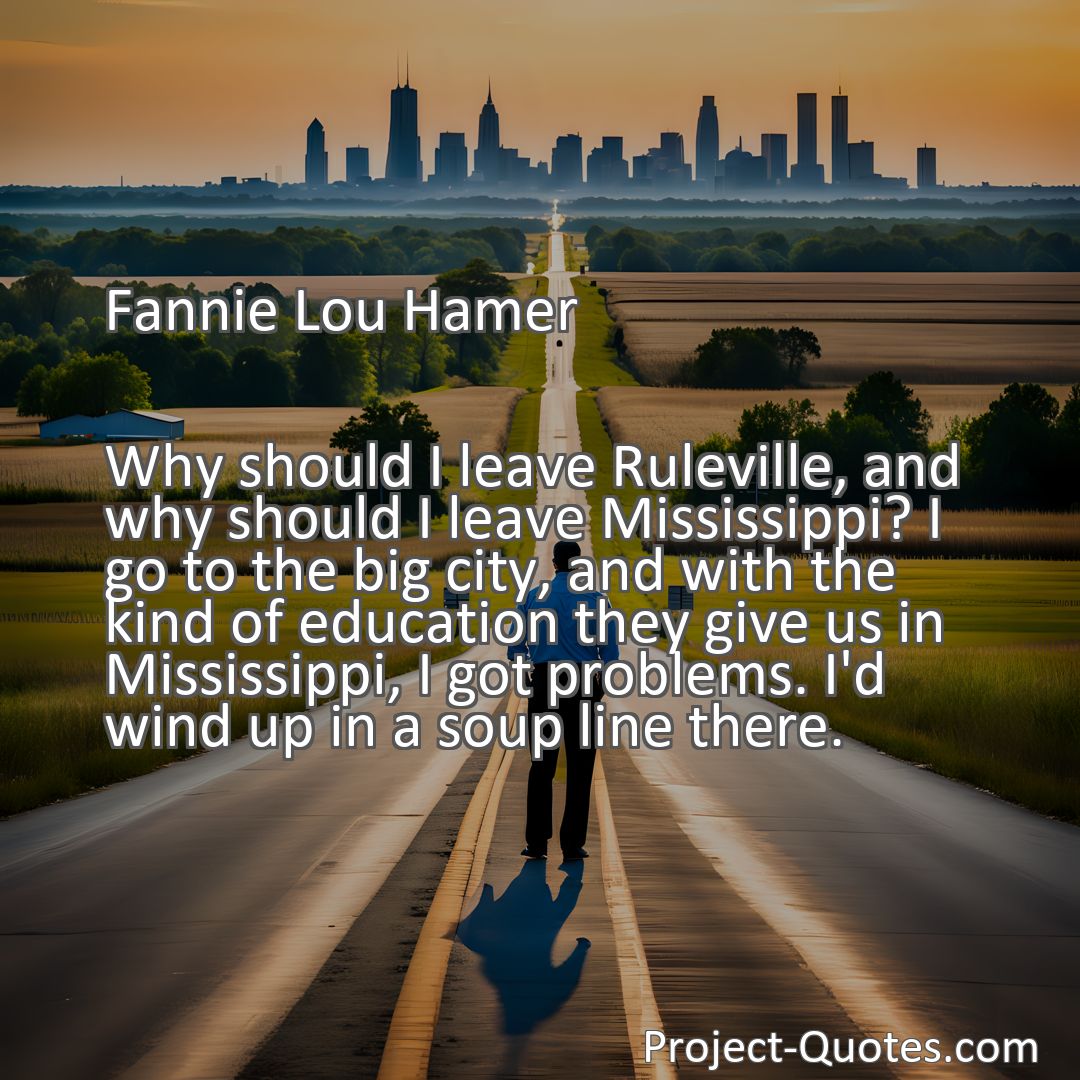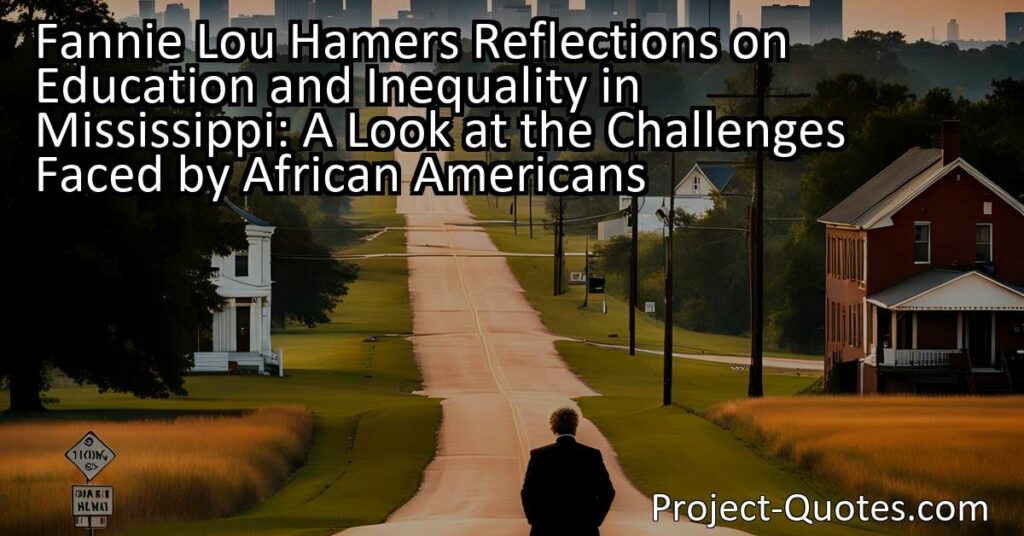Why should I leave Ruleville, and why should I leave Mississippi? I go to the big city, and with the kind of education they give us in Mississippi, I got problems. I’d wind up in a soup line there.
Fannie Lou Hamer
“Fannie Lou Hamer reflects on the challenges faced by African Americans in Mississippi, emphasizing the limitations of education. Her statement highlights the systemic inequalities and lack of opportunities for Black individuals during the mid-20th century. Her determination to stay and fight for her rights demonstrates her resilience and commitment to a more just society.”
Table of Contents
- 1 Why should I leave Ruleville, and why should I leave Mississippi? I go to the big city, and with the kind of education they give us in Mississippi, I got problems. I’d wind up in a soup line there.
- 2 Fannie Lou Hamer
- 3 Meaning of Quote – Why should I leave Ruleville, and why should I leave Mississippi? I go to the big city, and with the kind of education they give us in Mississippi, I got problems. I’d wind up in a soup line there.
- 4 Freely Shareable Quote Image
- 5 Related
Meaning of Quote – Why should I leave Ruleville, and why should I leave Mississippi? I go to the big city, and with the kind of education they give us in Mississippi, I got problems. I’d wind up in a soup line there.
“Why should I leave Ruleville, and why should I leave Mississippi? I go to the big city, and with the kind of education they give us in Mississippi, I got problems. I’d wind up in a soup line there,” said Fannie Lou Hamer, a prominent civil rights leader and activist.
Fannie Lou Hamer’s powerful words reflect the harsh realities and challenges faced by African Americans in Mississippi. Born on October 6, 1917, in the small town of Montgomery County, Mississippi, Hamer grew up in the oppressive era of racial segregation and discrimination. Her quote encapsulates the deep-rooted inequalities within the education system and the limited opportunities afforded to African American individuals, particularly in the rural South during the mid-20th century.
Growing up in a poor and racially divided South, Hamer experienced firsthand the inadequacies of the educational system. African American schools were underfunded and lacked resources, perpetuating a cycle of limited opportunities for Black students. Hamer’s statement highlights the stark reality faced by many African Americans during this time – that escaping the confines of Mississippi did not necessarily guarantee a better life or more opportunities.
In the mid-1900s, segregation and racial discrimination were deeply entrenched in the social fabric of Mississippi. African Americans were denied equal access to quality education, healthcare, employment, and voting rights. Hamer recognized that leaving her hometown and moving to the big city would not automatically provide her with a better life. Poverty and inequality were systemic issues that persisted beyond state borders.
Hamer’s quote also speaks to the systemic oppression faced by African Americans in Mississippi. Despite the injustices and limitations placed upon them, many individuals, like Hamer, were committed to fighting for equality and justice. Hamer became a formidable leader and advocate for civil rights, working tirelessly to challenge the status quo and effect positive change.
Leaving one’s hometown or state could be seen as a way to escape the oppression and discrimination faced in Mississippi. However, Hamer’s insight highlights the importance of confronting these issues head-on rather than simply fleeing them. By staying in Mississippi, Hamer actively participated in civil rights movements, organizing voter registration drives and supporting grassroots initiatives aimed at dismantling systemic racism.
Hamer’s determination to stay and fight for her rights and the rights of her fellow Mississippians is a testament to her resilience and her commitment to creating a more just society. It is important to acknowledge that leaving Mississippi was not a feasible or desirable option for everyone. Many African Americans lacked the financial means, access to transportation, or support networks necessary to relocate to a more progressive city or state.
This quote also sheds light on the socioeconomic disparities that existed between the rural and urban areas of Mississippi. Hamer mentions the possibility of winding up in a soup line in the big city, emphasizing the economic hardships faced by African Americans. The lack of quality education and limited job opportunities in Mississippi contributed to a cycle of poverty that was difficult to escape.
Hamer’s words remind us of the importance of equitable education and accessible opportunities for all individuals, regardless of their racial or socioeconomic background. It is through education that doors of opportunity are opened, empowering individuals to break free from the cycle of poverty and discrimination. By addressing the systemic issues within the education system, we can begin to provide a more promising future for all students.
In conclusion, Fannie Lou Hamer’s quote highlights the many challenges faced by African Americans in Mississippi during the mid-1900s. It sheds light on the limited opportunities and systemic oppression experienced by African Americans, particularly in the context of education and socioeconomics. Hamer’s decision to stay and fight for her rights rather than flee demonstrates her resilience and commitment to creating a more just society. Her words serve as a reminder of the importance of equitable education and accessible opportunities for all individuals, regardless of their background or geographical location. By addressing these issues head-on, we can work towards a more inclusive and equal society.
I hope this quote inspired image brings you hope and peace. Share it with someone who needs it today!


